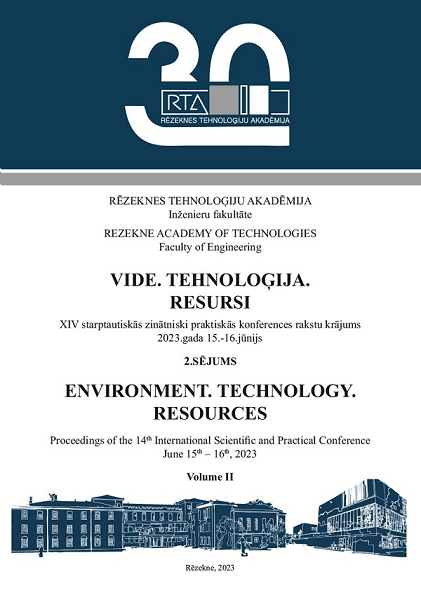ORGANIZATION OF STUDENT-ORIENTED PEDAGOGICAL STUDIES: ANALYSIS OF STUDENTS LEARNING EXPERIENCES
DOI:
https://doi.org/10.17770/etr2023vol2.7231Keywords:
interactivity, methods of study, reflective thinking, students of pedagogical studiesAbstract
With the development of technology, the organization of pedagogical studies is increasingly taking place in a mixed way, when studies in a real classroom are combined with learning in a virtual learning environment. However, regardless of the tools or resources used in the virtual learning environment, for the organisation of student-centred studies the pedagogical aspect remains essential. This need is highlighted in the Lithuanian and European Union documents. The research aim is to analyse the learning experience of pedagogical students. Methods of research: analysis of scientific literature, survey, descriptive statistics, and inference statistics. The article reveals Primary Pedagogy and Early Childhood Pedagogy students' learning experiences in the following aspects: relevance of learning, reflective thinking, interpretation the study process, interacting with the tutor and with peers. The results of a quantitative study (survey) showed that the relevance of learning, reflection and interpretation of the study process depends on the study methods used, the support provided by the tutors and peers.References
OECD Employment Outlook 2019: The Future of Work, OECD Publishing, Paris, https://doi.org/10.1787/9ee00155-en.
World Economic Forum, “The future of jobs report 2020,” [Online]. Available: https://www.weforum.org/reports/the-future-of-jobs-report-2020 [Accessed: March 20, 2023].
Geros mokyklos koncepcija, 2015. [Online]. Available: https://www.e-tar.lt/portal/lt/legalAct/f2f65120a7bb11e5be7fbe3f919a1ebe [Accessed: March 20, 2023].
Strategija, Valstybės Pažangos, "„Lietuvos Pažangos Strategija „Lietuva 2030 “." Lietuvos Respublikos Seimo nutarimas Nr. XI-2015, Vilnius, 2012.
G. Petty, Evidence based teaching: A practical approach. Cheltenham: Nelson Thornes, 2006.
A. Barana, A. Brancaccio, M. Esposito, M. Fioravera, M. Marchisio, C. Pardini, and S. Rabellino, “Problem solving competence developed through a virtual learning environment in a European context,” Elearning and Software for Education, vol. 1, pp. 455–463, 2017.
P. A. Facione, “Critical thinking: A statement of expert consensus for purposes of educational assessment and instruction," California State University, Fullerton, 1990.
R. H. Ennis, "Critical thinking dispositions: Their nature and assessability," Informal logic, vol. 18, no. 2, 1996, https://doi.org/10.22329/il.v18i2.2378.
R. Fisher, Teaching children to think. Oxford: Oxford University Press, 2014.
R. Kondratavičienė, “Primary school students’ critical and creative thinking skills in mathematics and their development through virtual learning environments,” Doctorate Thesis, Vytautas Magnus University, Lithuania, 2021.
P. McLaren. Life in schools: An introduction to critical pedagogy in the foundations of education. New York: Routledge, 2015. [E-book] Available: Google Play.
V. Čepaitė and R. Prakapas, “Metakognityvinių gebėjimų ugdymas socialinio ugdymo pamokose,” Socialinis darbas, vol. 11, no. 2, pp. 433–442, 2012.
T. Thonney and J. C. Montgomery, “Defining critical thinking across disciplines: An analysis of community college faculty perspectives, “ College Teaching, vol. 67, no. 3, pp. 169-176, 2019.
L. A. Ellis, "Peers helping peers: the effectiveness of a peer suport program in enhancing self-concept and other desirable outcomes," Doctorate Thesis, University of Western Sydney, School of Psychology, Sydney, Australia, 2004.
The Constructivist On-Line Learning Environment Survey (COLLES). [Online]. Available: https://totara.help/docs/survey-activity-types. [Accessed: March 20, 2023].
S. Bowkett. Jumpstart! Thinking Skills and Problem Solving: Games and activities for ages 7–14. New York: Routledge, 2014.
C. Byrge and S. Hansen, "The creative platform: a handbook in creative processes for education and Worklife,". Frydenlund Academic, 2015.
P. Taylor and D. Maor, "Assessing the efficacy of online teaching with the Constructivist Online Learning Environment Survey," in 9th Annual Teaching Learning Forum, 2-4 February 2000.
D. Willingham, "How to teach critical thinking," Education: Future Frontiers, vol. 1, pp. 1-17, 2019.
V. Žydžiūnaitė and A. Arce, "Being an innovative and creative teacher: passion-driven professional duty," Creativity Studies, vol. 14, no. 1, pp. 125-144, 2021.
T. M. T. Alkalaf, "The Effectiveness of a Constructive Learning Approach in Acquiring Science Processes and Developing Thinking Skills: A Meta-Analysis Study By," Turkish Journal of Computer and Mathematics Education, vol. 12, no. 11, pp. 6814-6835, 2021.
R. W. H. L. Cunningham, "Creating interactive sociocultural environments for self-regulated learning," Self-regulation of learning and performance: Issues and educational applications, vol. 17, 2023.
M. Coomey and J. Stephenson, "Online learning: It is all about dialogue, involvement, support and control-according to the research," in Teaching & learning online. Routledge, pp. 37-52, 2018.
A. Targamadzė, Virtualusis mokymas. Teorija ir praktika. Vilnius: Vitae litera, 2020.
S. Y. Phoong, S. W. Phoong and K. H. Phoong, "The effectiveness of frog virtual learning environment in teaching and learning mathematics," Universal Journal of Educational, vol. 8, no. 3B, pp.16-23, 2020.
N. A. Razzak, "Strategies for effective faculty involvement in online activities aimed at promoting critical thinking and deep learning," Education and Information Technologies, vol. 21, pp. 881-896, 2016.
ALLEA - All European Academies, The European Code of Conduct for Research Integrity, Berlin, 2017. [Online]. Available: http://www.allea.org/wp- content/uploads/2017/05/ALLEA-European-Code-of-Conduct-for-Research-Integrity-2017.pdf. [Accessed: March 20, 2023].



